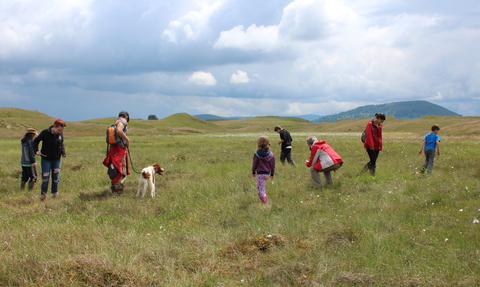
Exploring the wetland at an Eycott Hill Discovery Day
Information for dog owners
Visiting Cumbria Wildlife Trust nature reserves with your dog
The Trust allows dogs to be walked on most of our nature reserves. However, in order to protect ground nesting birds from disturbance, dogs are not permitted at South Walney Nature Reserve at any time.
Temporary or seasonal restrictions may be in place at other nature reserves during the bird nesting season, which will be indicated on our nature reserve pages.
Dogs should be kept on a lead (or under close control) at all times so that they don’t disturb wildlife or livestock
At all our nature reserves we request that dog owners pick up dog poo and take it away with them.
Dog poo: what to do
What to do about your dog’s poo when walking in the countryside can be confusing for owners. Signs in different areas can give different instructions and many dog owners think that dog poo is ‘natural’ anyway and that they can just leave it.
Pick it up for wildlife
Wildflowers and plants need low nutrient soil to thrive. Soils enriched with dog faeces encourage the growth of coarser plants such as nettles and thistles, which compete with and outgrow many wildflowers.
Pick it up for people
Nature reserves are used by all kinds of different people including children, wheelchair users and volunteers, who are often working to improve wildlife in areas on and near the footpaths.
Cleaning up after your dog prevents others from getting faeces on their feet, hands or clothing, or in the wheels of wheelchairs and pushchairs. This is not just unpleasant – dog faeces can cause serious diseases in humans such as Canine Toxocariasis, which can lead to blindness.
Dog poo also takes a while to biodegrade and the unsightly mess is around long after their visit for others to experience.
Pick it up for livestock
Dog poo can cause serious disease in domestic livestock. Neosporosis can cause abortion in cattle; Sarcocystosis can cause neurological disease and death in sheep.
Bag it and take it away with you
In public parks or on private estates you will often find special bins in which to put dog poo, which are emptied by staff. Unfortunately Cumbria Wildlife Trust is not able to offer the same service, so please take away your poo bags to the nearest bin or take it home with you. Dog poo left in bags on walls or hung in trees will not be removed by staff.
Dogs and wildlife
On leads for wildlife
Dogs that are allowed to run about cover considerably more ground than the route of the footpath. It’s only natural for dogs to chase or to dig, indeed many breeds have been specifically bred to do this, but it is not appropriate on a nature reserve.
Nature reserves are a haven for wildlife. To protect the wide range of species, dogs must be kept on a lead or under close control at all times.
On leads for farm animals
Domestic animals are often disturbed by dogs – even those not posing a direct threat – as they may not understand that some dogs are harmless whilst others may attack.
Livestock graze many of our nature reserves as part of our management work. In extreme cases worrying and death of livestock can occur.
On leads for other reserve visitors
Many owners understand their dog’s behaviour, but excitable dogs can cause anxiety for people who are afraid of dogs, particularly when they are off the lead.
Similarly, loose dogs can be a hazard to staff and volunteers working on our nature reserves and there can be difficulties when dominant dogs meet.
Help us share our message
Nature reserves aren’t just for wildlife, they are for people to enjoy too. Please help us communicate this message to other dog owners so that nature reserves can be wonderful places for everyone.
We hope you enjoy your visit – thank you for treating these sensitive areas with respect.
